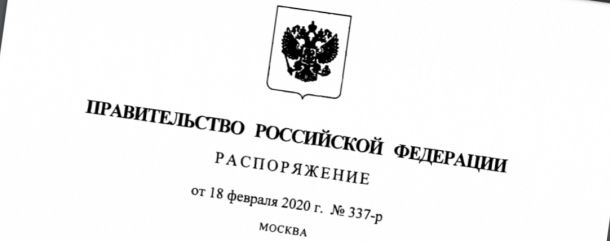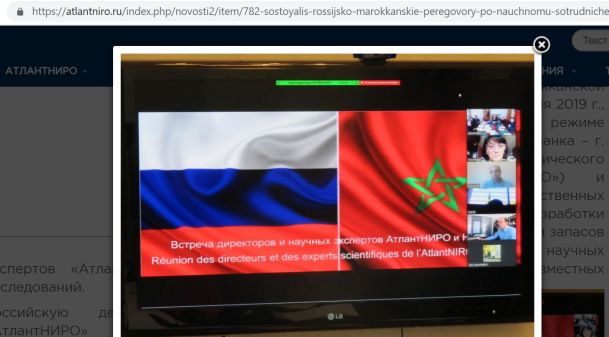
Russian and Moroccan representatives recently met to further discuss a new fisheries agreement covering the waters offshore occupied Western Sahara, but a new deal seems still pending.
A video conference took place earlier in May between Russian and Moroccan colleagues to discuss the future of the two countries' fisheries partnership. This was published on the website of the Russian Federal Research Institute of Fisheries and Oceanography on 9 May [or download].
The director of the Russian institute's Atlantic branch (AtlantNIRO) and his homologue of the Moroccan Maritime Research Institute both took part in the talks. The Moroccan head expressed that the video meeting was important "in anticipation of the signing of a new agreement" for fisheries between the two countries. The Russian government writes elsewhere on 6 May that it has been "decided to sign such a document through diplomatic channels in the near future".
Such new agreement will be highly controversial, as it would be applied in occupied waters of Western Sahara, in violation of international law. Russia has made no apparent efforts to obtain the permission of the Saharawi people, as international law requires. The Russian government claims on its website that the agreement applies to "the Atlantic fishing zone of Morocco" [or download]. Most likely, this is factually incorrect. All previous Russia-Morocco agreements have been applied outside of Morocco's international borders, in waters under occupation.
Western Sahara Resource Watch has for several years monitored the Russian fleet offshore the occupied territory, and has observed how the illegally caught fish is exported to countries in West Africa.

The AtlantNIRO head office beginning of this month met Russian colleagues in Kaliningrad and Moroccan counterparts in Casablanca. Source: AtlantNIRO.ru.
According to the Russian Fisheries Research Institute, a separate Russian-Moroccan Joint Fisheries Commission took place from April 28 to April 30, 2020. As that joint meeting began, a number of practical issues relating to a new bilateral fisheries agreement had still not been clarified. It is not clear to WSRW what the outcome of that important joint meeting was, nor when a new agreement might be signed. The outstanding issues that the parties still not had agreed to, related to technicalities of payments and quotas.
The Russia's Federal Fisheries Agency [or download] stated on 10 April, that the Russian and Moroccan parties had agreed on a draft agreement, but that "catch volumes and financial compensation of the parties should be agreed at the next session of the Russian-Moroccan Joint Fisheries Commission. In connection with measures to prevent the spread of Covid-19, the session would reportedly be organized via video-conferencing."
Media reports suggest that the two parties still had different expectations when the joint-meeting took place at the end of April.
The Moroccan side entered into the talks with a suggested figure of 8 million USD annual sectorial support plus a 22 million dollar payment, for a quota of 129.500 tonnes, according to Moroccan media on 4 March 2020 [or download]. The Russian side seems to have suggested 140.000 tonnes of fish.
Western Sahara Resource Watch has now translated the Russian version for a draft agreement into English. The unofficial translation is made with track changes, in order to highlight all amendments made from the previous version of the agreement, from 2016. As can be seen, there are no particular changes to the draft file from the previous agreement.
The document is titled Order of the Government of the Russian Federation (N° 337-r), of 18 February 2020, "On the signing of the Agreement between the Government of the Russian Federation and the Government of the Kingdom of Morocco on cooperation in the field of marine fishing" can be found on the Russian government's website (in Russian) or download.
The Russian-Moroccan conversations had started already in early 2019, according to Moroccan media [or download].
On 7 April 2020, four years after signing the previous agreement, the Moroccan Official Bulletin published Dahir N° 1-16-171 of 16 March 2020, containing the text of the 2016-2020 Russia-Morocco fisheries agreement, as signed on 15 March 2016 [or download]. Perhaps, as some Moroccan media outlets reported, this particular publication made it possible for Russian vessels to fish "along the Atlantic coastline of Morocco", even though that previous deal had officially expired only a few weeks before, on 16 March 2020 [or download].
Under the previous 2016-2020 agreement, Russia accorded Morocco a fixed annual compensation of 7 million USD. In addition, Russian vessel owners paid for a licence fee of 17.5% of the total value of fish caught, as calculated on the basis of book prices (in U.S. dollars) per ton of following types of finished fish products: Frozen fish products at $ 596; bycatch at $1344; fish flour at $1176 and fish oil at $ 1008. In return, 10 Russian trawlers could catch 140,000 tonnes of fish during the first operative year of the deal. Both the quotas and the number of trawlers were reviewed annually.
Russia's first fisheries agreement with Morocco dates back to 1992. The recently published agreement is the eighth of its kind.


